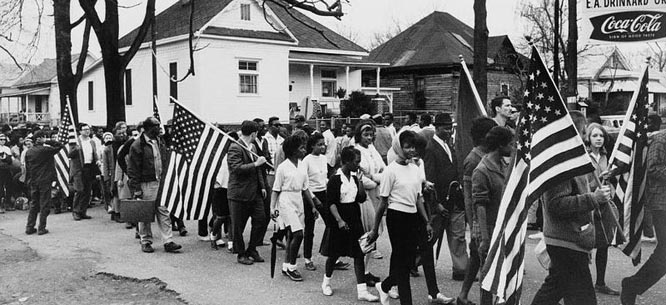Forty-Eight Years After Selma: The New Fight for Voting Rights
Forty-Eight Years After Selma: The New Fight for Voting Rights

Forty-eight years ago tomorrow, on March 21, 1965, I was part of the Selma to Montgomery Voting Rights March. There were only 3,200 of us who started out from Brown Chapel on that bright Alabama Sunday, but as far as the angry crowds along our march route were concerned, we were an invading army. We had no business protesting the discrimination that kept so many blacks off the Alabama voter rolls.
Two weeks earlier, civil rights protesters, among them future Georgia congressman John Lewis, had started out on the same march route, but they were badly beaten by Alabama state troopers as they crossed the Edmund Pettus Bridge. Among the white Alabamians I saw that afternoon, it was clear most still believed the Alabama state troopers had done the right thing. Their shouts of “white nigger” and the “Coonsville USA” sign I passed early in the march left no room for doubt.
I stayed in Alabama to help prepare the campsites for the following days of the march, which would not reach Montgomery until Thursday, March 25, and during that time none of the hatred I experienced at the opening of the march lessened. But when I returned to Providence, where I was in graduate school at Brown, I nonetheless felt hopeful. The Selma marchers I met, most of whom had simply dropped what they were doing and come south on their own, sent an unmistakable message. We, not the crowds jeering us, spoke for the future. It did not surprise me that in August Congress passed the Voting Rights Act of 1965.
This February, along with a group of historians and social scientists, I have put my name on an amici curiae brief in support of Section 5 of the Voting Rights Act, which is being challenged in a Supreme Court case, Shelby County v. Holder. Today, instead of feeling hopeful as I was in 1965, I am anxious.
This Supreme Court’s conservatives have given every indication that they would like to undo Section 5, which Congress extended for twenty-five years in 2006 with a bipartisan vote of 390 to 33 in the House and 98 to 0 in the Senate.
Section 5 is so critical because it requires nine states—Alabama, Alaska, Arizona, Georgia, Louisiana, Mississippi, South Carolina, Texas, and Virginia—plus numerous counties and municipalities in other states with a history of discrimination to obtain pre-clearance from the Justice Department or a federal court before making any change in their voting laws. Without this pre-clearance requirement, the only remedy for minority voters discriminated against in these state and jurisdictions is to go to court after their rights are violated—often too late to affect the outcome of an election.
At least two of the justices on the Supreme Court already appear to have their minds made up on the constitutionality of Section 5. Justice Antonin Scalia has called Section 5 the “perpetuation of a racial entitlement”; Justice Anthony Kennedy has asked whether Alabama is an “independent sovereign” or must live “under the trusteeship of the United States government.”
Even more worrying, however, is the current Republican strategy of seeking to limit the voting power of minorities who favor the Democratic Party. In recent years Republican state legislatures from Florida to Pennsylvania have sought to reduce the impact of minority voting by passing new voter ID laws, limiting voting hours, and gerrymandering election districts so that black and Hispanic voters within them are a minority. As a result, in 2012, despite receiving 1.4 million fewer votes for Congress than Democrats, Republicans kept control of the House by a 234 to 201 margin.
In 2012 Section 5 rulings limited Republican efforts to reduce minority voting in the key states of Texas and South Carolina, but there is no telling how many politicians in other covered states and districts were discouraged from suppress-the-vote efforts because they knew they faced legal challenges they could not overcome.
I am glad I signed the amici curiae brief I did. I am encouraged that, according to the NAACP Legal Defense and Educational Fund, more than two dozen other amici briefs urging the Supreme Court to uphold the constitutionality of Section 5 were filed for Shelby County v. Holder. But I don’t tell myself such briefs are going to have a big impact on this court’s conservative justices. The only reassuring news I see these days is that so many minority voters are as determined as they were in the 1960s to make their votes count.
Nicolaus Mills is professor of American studies at Sarah Lawrence College and author of Like a Holy Crusade: Mississippi 1964, The Turning of the Civil Rights Movement in America.






